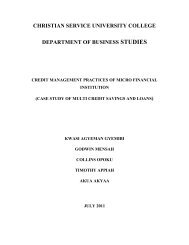TAX EVASION.pdf - Christian Service University College
TAX EVASION.pdf - Christian Service University College
TAX EVASION.pdf - Christian Service University College
You also want an ePaper? Increase the reach of your titles
YUMPU automatically turns print PDFs into web optimized ePapers that Google loves.
While precise figures are unknown, European Union governments may be losing up to €100<br />
billion annually to tax evasion, with Germany and the UK’s annual losses estimated at about €30<br />
billion each.<br />
Attempts are being made to address the situation. Berlin’s recent decision to pay €5 million to a<br />
Liechtenstein informant in order to gain access to a list of wealthy German tax evaders was a<br />
watershed, a clear break with previous policy.<br />
Broad support for the move from other European governments may also be an indication that<br />
political will is growing to bring Europe’s tax systems more in line, to provide clarity and reduce<br />
contradictions between free trade and non-harmonized tax structures. However, in the short term,<br />
tax advisers, companies and individuals will probably continue to operate in an environment of<br />
legal uncertainty, with greater potential not only for risks, but also for tax-dodging opportunities.<br />
2.17 China’s Measures to Combat Tax Evasion<br />
The Chinese State Administration of Taxation has removed tax privileges afforded under various<br />
double taxation treaties to foreign investors who misuse the system of ‘special purpose vehicles’<br />
as a means of reducing their tax liabilities or circumventing exchange controls.<br />
Since the issue of Tax Notice 81 of February 20, 2009 there have been a number of cases where<br />
the non-resident status of these entities has been disregarded for tax purposes.<br />
The Special Purpose Vehicle (SPV) allows foreign investors, who create business ventures with<br />
local partners in China, two main tax advantages - to apply withholding tax on dividends<br />
remitted abroad at a lower rate where this applies under an applicable double taxation treaty and<br />
exemption from Chinese capital gains tax on sale of their holdings.<br />
At present tax on dividends in China is at the rate of 10% but Singapore and Hong Kong double<br />
taxation treaties allow this to be reduced to 5%. Lower treaty rates also apply for Mauritius,<br />
Barbados and Ireland.



